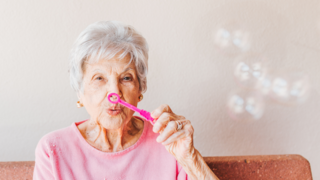Coronavirus Disease 2019
How Is the Pandemic Affecting the Mental Health of Seniors?
New research reveals seniors tend to be mentally healthier than younger adults.
Posted January 11, 2021 Reviewed by Lybi Ma

When we think of older adults during the COVID-19 Pandemic, images of them living in long-term care communities sheltering in place with hands pressed against windows trying to connect with loved ones fill our heads.
The year 2020 was one of incredible hardship and pain for many people and especially for many older adults and their families. The Centers for Disease Control and Prevention (CDC) tells us that since the beginning of the COVID-19 pandemic, older adults have the greatest risk of requiring hospitalization or dying if they’re diagnosed with COVID-19. This has been one of the most heartbreaking fallouts of the pandemic.
We also know that many older families living with dementia or other significant illness during COVID-19 have been hit especially hard with closures of adult day programs, reduction of services, and physical distancing. Not to mention, that when people with dementia become disoriented, the presence of family and friends, which is well-known to benefit people experiencing disorientation, is limited, and with masks blocking our facial expressions, it's harder to reassure and soothe people who desperately need comfort and reorientation.
A message of hope
All of this is true, and yet, it's only part of the story when it comes to the experience of older adults during the COVID-19 Pandemic.
Research over the past year has shown that older adults have been, by and large, psychologically quite resilient during the pandemic.
In August 2020, the CDC published a survey of more than 5,000 adults. The older adults surveyed reported significantly lower percentages of anxiety disorder (6.2 percent) depressive disorder (5.8 percent) or trauma- or stress-related disorder (TSRD) (9.2 percent) than participants in younger age groups. For example:
- Among young adults aged 18 through 24, 49.1 percent reported anxiety disorder; 52.3 percent, depressive disorder; and 46 percent, TSRD.
- Among participants between 25-44 years old, 35.3 percent reported anxiety disorder; 32.5 percent, depressive disorder; and 36 percent for TSRD.
- Of participants aged 45-64 years old, 16.1 percent reported anxiety disorder; 14.4 percent, depressive disorder; and 17.2 percent, TSRD.
Older adults also reported lower rates of substance use and suicidal ideation in the preceding 30 days, compared to the younger age groups.
These findings are similar to other reports from other countries like Spain, Canada, and the Netherlands.
Here's the bottom line:
Older adults tend to be really good at coping
At the beginning of the pandemic, as a society and health and mental health providers, our immediate concerns focused on how older adults would respond to COVID-19 and we were especially concerned about how loneliness and isolation would be exacerbated as lock-down measures were implemented.
What we have seen, however, are high rates of resilience among older adults.
What is resilience?
Psychologists define resilience as the process of adapting well in the face of adversity, trauma, tragedy, threats, or significant sources of stress—such as family and relationship problems, life-altering health problems, disasters, COVID-19 (American Psychological Association).
To illustrate this point even further, in a recent New York Times article, Mark Brennan-Ing, a senior research scientist at Hunter College’s Brookdale Center for Healthy Aging, described this phenomenon of older adults coping well with the COVID-19 pandemic as “crisis competence”.
“There’s crisis competence. As we get older, we get the sense that we’re going to be able to handle it, because we’ve been able to handle challenges in the past. You know you get past it. These things happen, but there’s an end to it, and there’s a life after that.”
How are older adults with depression doing during COVID-19?
Even older adults with depression and anxiety are proving to be resilient during the COVID-19 Pandemic.
Researchers from five academic institutions, (UCLA, University of Pittsburgh, Columbia University, Washington University in St. Louis, and the Centre for Addiction and Mental Health/University of Toronto) recently found that the older adults, who were already enrolled in ongoing studies of treatment-resistant depression, also exhibited resilience to the stress of physical distancing and isolation.
"We thought they would be more vulnerable to the stress of COVID because they are, by CDC definition, the most vulnerable population, but what we learned is that older adults with depression can be resilient. They told us that coping with chronic depression taught them to be resilient". —Helen Lavretsky, MD, a professor-in-residence of psychiatry and behavioral sciences at the Jane and Terry Semel Institute for Neuroscience and Human Behavior at UCLA.
This study found that the rates of depression, anxiety, and suicidal ideation symptom scores did not differ from scores before the pandemic. This study also found that older adults were:
- More concerned about the risk of contracting the virus than the risks of isolation.
- Worried their mental health will suffer from continued physical distancing.
- Outraged by inadequate government response to the pandemic.
Lavretsky went on to say:
"These older persons living with depression have been under stress for a longer time than many of the rest of us. We could draw upon their resilience and learn from it."
Learn more about the mental health of older adults during the COVID-19 Pandemic here:
Are you doing everything you can to stay mentally healthy during COVID-19? Download the COVID-19 Wellness Guide for Older Adults to find out.
References
Vahia IV, Jeste DV, Reynolds CF. Older Adults and the Mental Health Effects of COVID-19. JAMA. 2020;324(22):2253–2254. doi:10.1001/jama.2020.21753
Megan E. Hamm, Patrick J. Brown, Jordan F. Karp, Emily Lenard, Flor Cameron, Alicia Dawdani, Helen Lavretsky, J. Philip Miller, Benoit H. Mulsant, Vy T. Pham, Charles F. Reynolds, Steven P. Roose, Eric J. Lenze. Experiences of American Older Adults with Pre-existing Depression During the Beginnings of the COVID-19 Pandemic: A Multicity, Mixed-Methods Study. The American Journal of Geriatric Psychiatry, 2020; 28 (9): 924 DOI: 10.1016/j.jagp.2020.06.013




